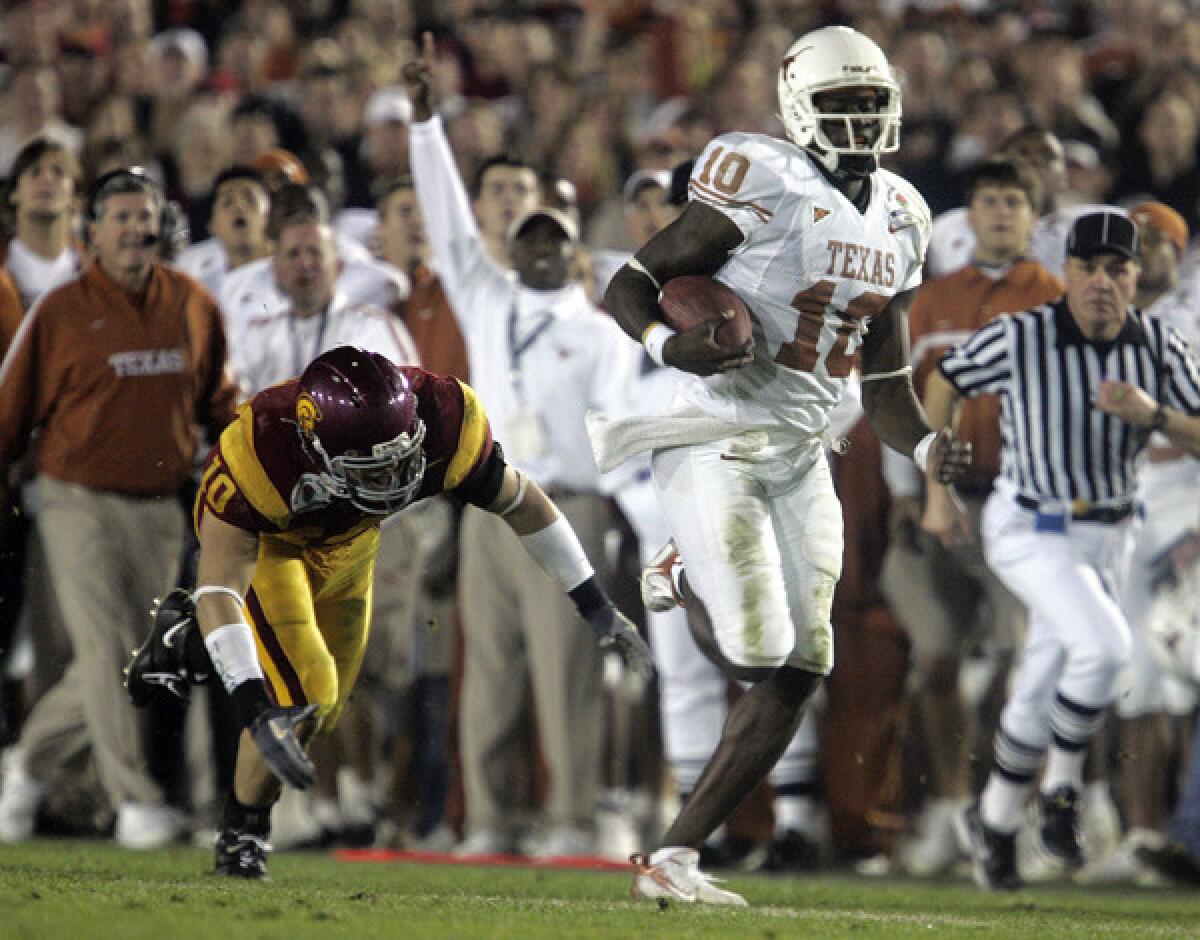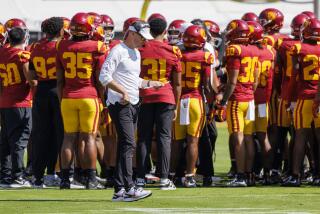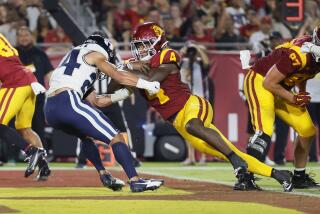The playoff era could make games like USC vs. Texas a rarity

- Share via
Eight years ago, USC’s senior associate athletic director, Steve Lopes, called his counterpart at Texas, Butch Worley, and floated an idea. What if USC and Texas played a home-and-home series?
Worley was intrigued. Coaches and athletic directors from both schools signed off, and now, finally, the Trojans and the Longhorns will play Saturday at the Coliseum and again next season in Austin, Texas.
Most officials view games like this as good for college football. They excite fans; USC announced it has sold out the Coliseum for the first time since 2013. They also must be scheduled far in advance. In the interim, something strange happened.
The game has become an anachronism. In the College Football Playoff era, such matchups no longer make much sense, particularly for USC.
“It’s going to be much more difficult to justify playing those kinds of series,” Lopes said. “Is it great for college football? Absolutely. Is it great for us to try to get to the final four, to the CFP? Probably not.”
Such series will not disappear completely, but in three seasons in the playoff era, a playoff spot has never been awarded to a team with more than one loss. Scheduling a tradition-rich program like Texas, in addition to Notre Dame and a nine-game conference schedule, makes staying at one loss more difficult.
Take Washington and Ohio State last season. Washington’s non-conference schedule was a pillow fight, and the Huskies still made the playoff with one loss. Ohio State made it into the playoffs last season, despite losing to conference champion Penn State, in part because Ohio State went to Oklahoma and won. But the Buckeyes didn’t have to test themselves against another big-time team out of conference.
For USC, Lopes said, “Between nine Pac-12 games and Notre Dame, you always ought to get the strength of schedule that you need.”
Lopes cautioned that the playoff era has only entered its fourth season, and teams need more data points to form a more informed philosophy. But, he noted, most other power conference teams need a marquee nonconference game just to match USC’s annual tilt against Notre Dame. And teams in the Atlantic Coast Conference and the Southeastern Conference play one fewer conference game.
Lopes spoke in his office last week, where he pulled out a thick ream of papers, stuffed with spreadsheets highlighted in yellow. It was USC’s master schedule. USC has games scheduled against Brigham Young, Fresno State, New Mexico and Rice as far out as 2025.
As Lopes adds to the slate, he said he would still look “strategically” for marquee opponents because “we love playing big games.”
A few other power conference teams play long-standing nonconference games like USC does against Notre Dame. Only four of those — Michigan State and Stanford (vs. Notre Dame), and Iowa State and Iowa (against each other) — play a nine-game conference schedule. In the other nonconference rivalries, including Georgia-Georgia Tech and Florida-Florida State, the teams all play an eight-game conference schedule.
That extra game can make a big difference. It’s enough to make Longhorns coach Tom Herman hesitant to schedule more games against bluebloods.
“I have mixed emotions,” he said. “I think it’s great for our fans, I think it’s great for our program to have these. I think it’s a little different, though, when you play nine conference games. It makes scheduling, especially when you’re trying to rebuild, it makes things a little more difficult.”
USC coach Clay Helton said he enjoys games against teams like Texas or Alabama, which walloped USC last season, because winning leaves no doubt for the playoff selection committee.
“You’re gonna build a resume that if you do your job, there’s no question that you should be one of those four teams,” Helton said.
Quarterback Sam Darnold was more blunt.
“We’re USC,” he said. “We’re not scared to play anyone.”
Gustin injured
Linebacker Porter Gustin injured his shoulder and toe against Stanford. He did not leave the game but underwent an MRI exam on his shoulder on Sunday and was still “really sore” on Monday, Helton said.
Gustin did not practice on Tuesday. Helton provided few other details but said USC was evaluating both injuries and Gustin was “day-to-day.”
“I’ll give you more info” on Wednesday, Helton said.
Quick hits
Right tackle Chuma Edoga (wrist) did not practice. … Linebacker John Houston Jr. was limited in practice after sustaining a stinger on Saturday. … With backup placekicker Mike Brown out for the season with a torn anterior cruciate ligament sustained on Saturday, punter Reid Budrovich became the backup to Chase McGrath.
Times staff writer David Wharton contributed to this report.
Follow Zach Helfand on Twitter @zhelfand
More to Read
Go beyond the scoreboard
Get the latest on L.A.'s teams in the daily Sports Report newsletter.
You may occasionally receive promotional content from the Los Angeles Times.







